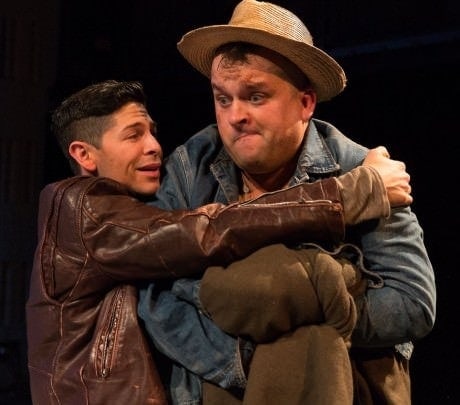The Acting Company presented a powerful and heartbreaking production of John Steinbeck’s 1937 play Of Mice and Men at George Mason University’s Center for the Arts on Sunday, April 28th. The production was well received by the capacity crowd and continues to be relevant after 60+ years. The Scenic Design by Neil Patel was an evocative backdrop of cumulus clouds bringing to mind an open prairie. Director Ian Belknap did a fine job of leading an ensemble filled with exceptional actors who portrayed characters who communicated various degrees of discomfort towards each other, reminding us of the isolation and vigilance necessary on a ranch during the early days of the Great Depression.

One of the reasons John Steinbeck won the Nobel and Pulitzer Prize is the powerful theme of his work – an exploration of powerlessness. His work, which includes The Grapes of Wrath, explores the American dream, a dream of economic individualism. Steinbeck shows us a Darwinian world in which a work ethic is not enough to ensure survival. The norm is to be alone, vulnerable, and sometimes hungry. The unfit attract scorn and those who are forlorn or abused sometimes turn on each other. This is especially meaningful in today’s economic conditions when people have less and less freedom to take up or set aside work, less economic security than was once expected, and the dream of a homestead of one’s own seems elusive.
The story is based on Steinbeck’s own experiences as a bindlestiff, or farm worker, in the 1920s The title is taken from Robert Burns’ poem “To a Mouse,” which describes how a field mouse’s world is destroyed by a plow. It read: “The best laid schemes o’ mice an’ men /Gang aft agley.” (The best laid schemes of mice and men /Often go awry).
Two lonely and alienated men work as farm laborers, drifting from job to job in California. Lennie is gentle giant, physically strong but mentally retarded. George guides and protects Lennie but also depends on him for companionship. Together, they have a dream to someday buy a little farm where they can grow crops and raise rabbits and live happily ever after. It remains to be seen whether this is a dream or a mirage. Like mice and old dogs, men’s lives can be brief, unpleasant, and cut short prematurely as competition, old age or injuries undermine their usefulness and hence their value. This is a world in which mercy is in short supply. It remains to be seen if these characters can overcome a sense of loneliness and isolation.
Joseph Midyett and Christopher Michael McFarland have terrific chemistry together as George and Lennie. They are friends who have been traveling together, working from place to place as farm laborers, and both are credible as unequally yoked friends and McFarland is particularly effective as an enormous retarded man who has the social development of a child and is frequently panicky when he thinks he has done something bad, or “really bad.”
Another difficult role is Crooks, a “Colored” and crippled hired hand who is isolated by his race and who articulates the loneliness that afflicts others, who “need someone to listen.” He has to play this difficult role with a dialect and bent over, and Yaegel T. Welch pulls it off and is so convincing in the haunting role.
The other members of this extraordinary ensemble are Candy (Joseph Tisa), The Boss, (Ray Chapman), Curley (Michael McDonald), Slim (Noah Putterman), Carlson (Chris Thorn), and Whit (Ray Chapman). Meagan Bartle is the sole actress in the ensemble, and plays the sensitive “Curley’s Wife,” a flirt who endangered the men by her persistent intrusion into their space and only later on garnered some sympathy.
The Sound Design was by Fitz Patton, who used Woody Guthrie’s song “This Land is Your Land,” to provide further context for the political climate and eventual radicalization to which Steinbeck’s works contributed. Fight Direction by Felix Ivanoff was extremely effective in the several violent scenes of the production.
Again, kudos to the effective ensemble work and the ability the actors displayed to portray characters facing physical and moral challenges, who we can still identify with today, despite today’s ever-changing gender and racial dynamics.
Of Mice and Men was a one-time-only event on April 28, 2013 at George Mason University’s Center for the Arts – at Braddock Road and Route 123 in Fairfax, Virginia. For upcoming events, and to purchase tickets, check their calendar.




